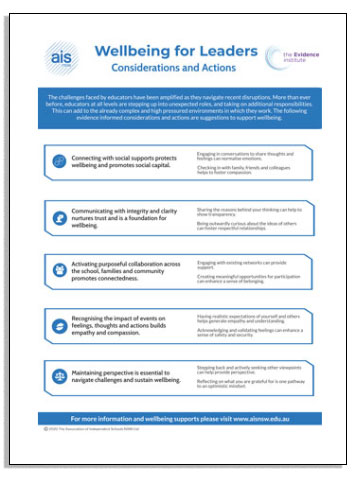There has never been a better time for education leaders to ensure they are maintaining their wellbeing, writes The Evidence Institute.
Educators in all roles, and at all levels of experience, are navigating significant technological and societal change. The degree to which education leaders can respond to these challenges is generally a product of school and personal leadership characteristics. The unique circumstances of independent schools offer opportunities for targeted, personalised approaches to wellbeing support. Values and experiences also influence behaviours, and a leader’s agency in managing wellbeing challenges.
Ways for education leaders to find support for their wellbeing
Social support is important as a way of minimising and addressing wellbeing challenges.
The way in which all staff provide support for each other – a ‘sideways-in’ model – can directly influence a school’s broader culture, and as a result education leader wellbeing.1,2,3,4 Supports are shaped by a range of factors including personal experiences across school cultures or systems, as well as the degree of collegial support available.
Levels of trust between staff and leadership provides a foundation for positive wellbeing.
Mutual trust can provide a strong foundation for whole school support, and enhance cooperation and relationships.5 Clear and open communication is central to this process, along with ensuring all those in the school community act with integrity and fairness.3
Personal relationships with family and friends are a valuable source of support.
Existing time pressures experienced by education leaders are only being amplified by the current disruptions. Educators highly value connections with friends, family and colleagues as a way of maintaining balance and supporting their overall wellbeing.6 Fostering these relationships and exploring new ways to connect has never been more important.
Wellbeing challenges can result in inward and outward outcomes.
These are complex times and individuals will respond differently to them. Inwardly, individuals may experience altered levels of stress and physical health. Outwardly, changed professional behaviours and performance may be witnessed that influence personal and student wellbeing, along with the quality of teaching and learning. Recognising that there will be impacts, and providing space to connect and reflect remains essential.
Passion is both a motivator and a trigger of wellbeing challenges for education leaders.
The importance of maintaining work-life balance is recognised as essential for wellbeing, however finding this balance can be complex for education leaders. They are often driven to work additional hours by their passion for education, their students, and in support of other staff. It is important that this passion does not become a negative driver of behaviour and lead to additional wellbeing challenges.6,7 Checking in with trusted connections can assist.
Active collaboration between schools, families and the surrounding community can positively support wellbeing of education leaders.
Fostering collaborative partnerships can be beneficial in supporting the wellbeing of all members of a school community. Active and mutual engagement is more likely to enable positive and practical supports to be implemented. The shared purpose and understanding generated can in turn minimise many of the amplified triggers and stress factors arising in those relationships due to the changing learning environments.8 (NSW Department of Education & Communities, 2015).
Leaders and educators are stepping up more than ever before into unexpected roles and taking on additional responsibilities. This can add to the already complex and high pressured environments in which they work. With a culture of connection and collaboration it is more likely that tasks will be shared, recognition provided to inspire and motivate, and the ongoing wellbeing of education leaders supported.
For more information
Whilst supporting students and families, it is important for all educators and school staff to look after themselves. AISNSW provides a range of resources to assist with a whole school coordinated approach to supporting the wellbeing of educators, students, parents and carers. Please visit aisnsw.edu.au for more information.

Click on the image to download Wellbeing for Leaders: Considerations and Actions. This one-page information sheet provides evidence informed considerations and actions to support the wellbeing of all educators as they continue to step up and address challenges that have only been amplified as they navigate recent disruptions.
The team at The Evidence Institute undertakes research and shares evidence focusing on a range of areas impacting the education sector. We aim to generate high-quality evidence to transform educational futures for independent school students, staff, and communities. Through a range of initiatives and tailored supports, the team also partners with schools to bridge the research to practice gap, build school-based research capacity, and enhance the evidence-informed nature of the teaching profession. For further information, contact Tiffany Roos, Director: The Evidence Institute.
New to AISNSW and want to receive AISNSW Education News updates? Click here to register, and select ‘AISNSW Education News’ on the Areas of Interest/Subscriptions page.
References
1. Buchanon, J., Prescott, A., Schuck, S., Aubusson, P., & Burke, P. (2013). Teacher Retention and Attrition: Views of Early Career Teachers. Australian Journal of Teacher Education, 38(3), 112-129.
2. Cowley, A. (2019). The Wellbeing Toolkit: Sustaining, supporting and enabling school staff. London: Bloomsbury.
3. Day, C., & Grice, C. (2019). Investigating the Influence and Impact of Leading from the Middle: A School-based Strategy for Middle Leaders in Schools. Retrieved from https://www.aisnsw.edu.au/Resources/WAL%204%20%5BOpen%20Access%5D/Leading%20from%20the%20Middle%20-%20A%20School-based%20Strategy%20for%20Middle%20Leaders%20in%20Schools.pdf
4. Grenville-Cleave, B., & Boniwell, I. (2012). Surviving or thriving? Do teachers have lower perceived control and well-being than other professions? Management in Education 26(1) 3-5.
5. The Voice Project. (2019). Voice Bites: Trust in Leadership. Retrieved from https://www.voiceproject.com/system/files/Trust%2Bin%2BLeadership%2BVoice%2BBite.pdf
6. Riley, P. (2019). The Australian Principal Occupational Health, Safety and Wellbeing Survey: 2018 Data. Retrieved from https://www.principalhealth.org/au/reports.php
7. Vallerand, R.J., Blanchard, C., Mageau, G.A., Koestner, R., Ratelle, C., Leonard, M., & Gagne, M. (2003). Les Passions de l’Ame: On Obsessive and Harmonious Passion. Journal of Personality and Social Psychology. 85(4) 756-767.
8. NSW Department of Education and Communities. (2015). The Wellbeing Framework for Schools. NSW Department of Education and Communities.